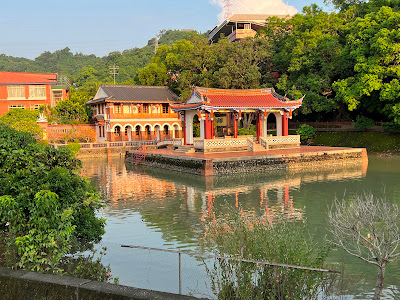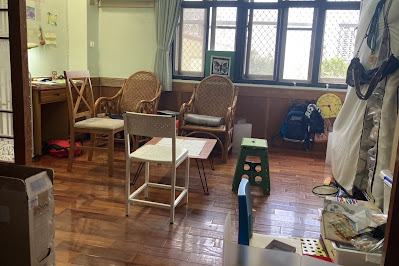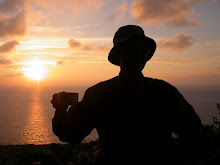我出生於幾個月前。一出生(或孵化)我便掉進了一個巨大的池塘——請不要誤會!如今我已成長為一隻成年的青蛙了。
在我成長之前,我只是一個有尾巴但沒有手腳的小生物。中文裡稱我為蝌蚪,英文叫做tadpole。
作為一隻新孵化的蝌蚪,我最初處於「完全無知」的狀態——無知是否是一種福?——然而,很快我發現自己深陷水中,或漂浮,或游泳。
多虧了我的長尾巴,使我成為一名迅捷的游泳者!
在相當長的一段時間裡,我獨自在水中享受著自己。我的半透明身體被水(水也同樣半透明)完美地包裹著。
在這樣的液體中,我的視力有限,但我能聽到遠處一些特別的聲音。此外,我還能在這個「水世界」中自由呼吸!——我可以在熟悉的「角落」裡游動,每天都能探索更遠的地方。
在一個未知世界裡旅行,的確是最令人興奮的事,儘管我在這個巨大池塘中的旅行可能充滿了危險。
事實上,我的生命旅程的確充滿了風險。但我還算幸運!我幸運地躲過了各種危險和麻煩。當我獨自待了一段時間,開始感到孤獨時,我遇到一群大約六個看起來和我差不多的生物。
「你們從哪裡來,朋友們?」我急需一兩個朋友,便問道。
「哦,我不知道!」其中一個回答道。
「我也不知道!」其他幾位附和道。
然後他們問了我同樣的問題。這讓我大吃一驚!我自己也不知道自己從哪裡來。
無論如何,那天下午我們進行了漫長而愉快的交談。我們互相分享了各自的經歷。我們每一位都很高興成為彼此的好兄弟姐妹。
那天下午晚些時候,我們又遇到了另外六個同類生物。其中三個加入了我們,形成了一個美好的「兄弟姐妹」群體。
另外三個,我注意到,確實是新孵化的蝌蚪。他們還不會游泳,剛剛從水面上方的某個地方掉進了這個池塘。
「他們到底從哪裡來?」我心裡燃起了強烈的好奇心。
和我的「兄弟姐妹」相處了幾個小時後,我又想一個人待著了。於是我向他們告別,沿著不同的方向游開了。
我似乎相當內向。「自省」因此成為了我生活的重要方式。這是另一種探索。
「我從哪裡來?又將去向何方?」我不禁這樣問自己。我找不到令我真正滿意的答案。我開始認為生命的奧秘肯定超出了我的理解。
也許當時我唯一能做的就是練習游泳。我希望當我長大後能成為最優秀的游泳者之一。
我游啊游。突然,我聽到身後傳來一些非常奇怪的聲音。我迅速轉身躲了起來,看到我的兄弟姐妹們驚慌失措——他們正被一隻大怪物驅散!
「那是什麼?……是一條壞魚嗎?……還是一條惡蛇?」
沒人回答我。
不久後,醜陋的怪物消失了,所有的噪音都消失了,整個池塘恢復了平靜。
然而,類似的事件很快再次發生。第三次,第四次,第五次......事件在同一天、同一個池塘裡相繼發生。
有些怪物顯然比其他怪物更「醜陋」。它們甚至一次造成幾十條生命死亡!
幾天後,我最好的一些朋友在一次致命的事故中失去了生命。當我看到池塘中發生那種「突發事件」時,我感到非常震驚。
三週後,我自己的身體開始以一種非常奇怪的方式發生變化。某個早晨,池塘靜得如同墳場,我早早醒來,看到了一些極不尋常的東西。當我看到肚子長出兩條腿時,我嚇得魂不附體。
不久,另外兩條腿(或稱為手臂)顯現了,而我的長尾巴迅速萎縮——最終消失了。
「這是正常的變形嗎?……還是有害的畸形?……我應該做什麼——或者我能做什麼?」我對發生的事情百感交集。無法面對自己的問題,我再次變得非常沮喪。
如果不是遇到了我的好老師烏龜先生,我真不如何應對這樣的困境。
※ ※ ※
事實上,我一直是一隻好奇的兩棲動物。我努力學習,不僅想弄清楚周圍的環境,還希望更進一步理解自己。
但我的學習能力似乎非常有限。唯一可以肯定的是,我的知識永遠趕不上我的好奇心;我學得越多,越覺得自己需要用功學習。
「嘿,小青蛙!」池塘附近傳來一個嘶啞的聲音。我看到一個長相奇怪的生物在岸邊的果樹下休息。後來我才知道,它是一隻年邁的烏龜,臉上帶著友好的微笑。
「你是個好學生,」他對我說。
「您確定嗎,先生?」我並不認為自己的學習成績夠好。
「是的,你渴望學習!你將成為一位偉大的學者!」
「哦,我只是……如果可以,我會……更加努力……」
起初,紳士般的烏龜先生讓我有點尷尬。然而,他鼓勵的話語,加上他的實際指導,就像魔法一樣,大大推動了我的生活。
很快,烏龜先生就成為我最好的朋友兼導師!
烏龜先生不是一隻兩棲動物[譯者註:英文原文誤將烏龜當作兩棲動物,其實,烏龜是爬蟲類動物],且比我年長得多,很有智慧。他出生於「九二一地震」前二十年,並在這個池塘裡生活了十五年。他對池塘非常了解,對池塘裡及周圍的生物和非生物瞭如指掌。
更重要的是,他非常善良和慷慨,總是願意與他人分享一切美好的東西。每當我向他求助時,他都會給我寶貴的建議,讓我平淡的日子變得五彩繽紛,讓我的普普通通變得意義非凡!
有時他會主動聊起這樣的話題:
「你怎麼樣,小青蛙?」
「嗯,馬馬虎虎。」
「為什麼,你看起來這麼沮喪!你現在真的需要聊一聊。」
「哦,謝謝您,烏龜先生。但我可以一次問您很多很多問題嗎?」
「不要猶豫,儘管問吧。讓我們看看你有多少問題。」
有時我的問題多得像這個池塘裡游泳的魚一樣。說到魚,有些魚比其他魚大得多。如果你在釣魚,你難道不會先試著抓大魚嗎?
我努力提出那些我認為最重要的問題。
「那是什麼?」我指著水面上的一個轉動裝置問道。那台機器看起來像一個小水車,但以很快的速度轉動著。
「那是一個魚塘泵,」烏龜先生解釋道。「它將氣體強行注入水中,以便水裡的生物有足夠的氧氣呼吸。」
「你是說連魚也不能沒有氧氣生存?」
「對極了,他們需要氧氣,就像需要食物。」
當我問到魚吃什麼,誰餵它們時,烏龜先生給我講了一些關於「物競天擇」的知識。他說,著名的英國科學家查爾斯·達爾文(1809-1882)在他的著作《物種源起》中寫過這個概念。
我不喜歡「適者生存」的理念,但我了解到在不同魚群之間有很多鬥爭,即使在同一魚群中也有激烈的競爭(除了合作之外)。
烏龜先生告訴我不要氣餒。他向我展示了一些更有趣的,令人鼓舞的事物。
「你知道那座橋為什麼叫『彩虹橋』嗎?想想看。」
「是的,先生。」我回答道。
「那座彩虹橋連接了因地震受損的五桂樓庭院和荔枝島上依然美麗的涼亭。這意味著什麼?你學過英語短語 at the rainbow's end 嗎?」
「我想我學過。」我說。「不過,您能不能先評論一下那些在池塘裡戲水的鳥類?」
「當然可以。首先,請把在這個池塘裡游泳(或掙扎)的魚比作在人類社會中生活(或工作)的人。然後,你可以將那些鴨子比作你的兄弟姐妹,或你的好朋友。」
烏龜先生停頓了一下,然後繼續說道:「請注意鴨子的顏色。鴨子羽毛的顏色各有差異,很可能你的性格跟你的好朋友也有很大的不同啊!」
「那麼鵝呢?」我打斷道。
「這兩隻雪白的鵝代表一對親密的夫妻。你看!無論是在池塘裡游泳,還是站在岸邊,這些鵝總是形影不離——喔,對了,你最近有沒有看到那隻在附近飛來飛去的白鷺鷥?」
「我沒注意到。但您會怎麼評價白鷺呢?」
「她象徵著『我』。在弗洛伊德的心理學中,心靈分為三部分:自我、超我和本我。這隻鳥有時站在池塘邊,有時高高飛翔在天空,有時隱藏在樹林中。無論它是否三位一體,請盡量不要迷失自我。」
突然,我為自己感到非常難過。我甚至不知道自己來自哪裡。我懇求烏龜先生進一步解釋我的生命,我的存在!最後,烏龜先生總結道,我是一種很特別的樹蛙,是我的主人用他的想像把我給創造出來的。
根據烏龜先生的說法,我的主人現在正在他家附近的高中校園跑步,而我很快就會在池塘邊的樹枝上產卵,這些樹枝懸在平靜水面的上方。(譯文完)



































































